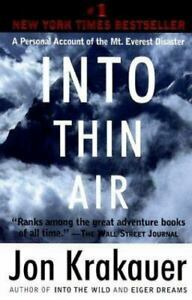Take a photo of a barcode or cover
adventurous
dark
informative
reflective
sad
tense
fast-paced
adventurous
challenging
reflective
tense
medium-paced
the introduction to this book, particularly the final couple of pages, is something that i read out or send to people often. forgive me for the long excerpt, but when you begin reading a book and it starts out like this, you know you're in for it:
Moreover, I agree that readers are often poorly served when an author writes as an act of catharsis, as I have done here. But I hoped something would be gained by spilling my soul in the calamity’s immediate aftermath, in the roil and torment of the moment. I wanted my account to have a raw, ruthless sort of honesty that seemed in danger of leaching away with the passage of time and the dissipation of anguish.
There were many, many fine reasons not to go, but attempting to climb Everest is an intrinsically irrational act—a triumph of desire over sensibility. Any person who would seriously consider it is almost by definition beyond the sway of reasoned argument.
The plain truth is that I knew better but went to Everest anyway. And in doing so I was a party to the death of good people, which is something that is apt to remain on my conscience for a very long time.
following this remarkable opening, a lesser writer than krakauer might begin the book proper at the very start of the journey to everest. instead, he puts us right on the summit with him, a moment he has been fantasising about for many months, and we get this staggering passage:
But now that I was finally here, actually standing on the summit of Mount Everest, I just couldn't summon the energy to care. It was early in the afternoon of May 10, 1996. I hadn’t slept in fifty-seven hours. The only food I’d been able to force down over the preceding three days was a bowl of ramen soup and a handful of peanut M&Ms. Weeks of violent coughing had left me with two separated ribs that made ordinary breathing an excruciating trial. At 29,028 feet up in the troposphere, so little oxygen was reaching my brain that my mental capacity was that of a slow child. Under the circumstances, I was incapable of feeling much of anything except cold and tired.
i'd never seriously thought about climbing everest (i'm a hiker, not a mountaineer) but i confess that before reading this book, if you'd asked me, i'd probably had said "never say never!" immediately after reading this passage i was like: nope. no way. not if you paid me. and this is before anyone has even died, before the true disaster begins, before the horror and devastation of the disaster is laid out in excruciating, intimate detail. if you can read about rob hall's final hours, stranded on the south summit in the "death zone", in communication with the ground but with nobody able to battle the gale-force winds to reach him and rescue him; if you can read about the way climbers have to step over the frozen corpses left on the slopes, the callous abandonment of some people in dire straits to their deaths by japanese climbers intent on their selfish pursuit of the summit--and you STILL want to go to everest? genuinely what the fuck.
i agree with krakauer that:
I quickly came to understand that climbing Everest was primarily about enduring pain. And in subjecting ourselves to week after week of toil, tedium, and suffering, it struck me that most of us were probably seeking, above all else, something like a state of grace.
but also the point that he continually makes which is that when climbing into the "death zone" (above 8,000m when the oxygen is too thin to sustain human life and the longer you're up there the closer you are to death) is linked to money, fame and making a living, that's when things go wrong. there is much controversy about the events of 1996, but i respect krakauer's humility and integrity in examining his positionality and cupability as a journalist on that expedition, as someone who could potentially give his guides a lot of needed publicity.
on this reread, i was struck by the viscerality of the descriptive language krakauer uses throughout this book: the gangrenous right hand of my teammate beck weathers; the night had a cold, phantasmal beauty; the crepuscular gorge; achieving the summit of a mountain was tangible, immutable, concrete; the enigma of mortality. it gives everest and the attempt to summit it a sense of grandiosity, distance, that contributes to the slow, snowballing horror of the disaster. truly a magnificent book, and a horrible tragedy.
Just as heart-wrenching and informative as you would expect.
adventurous
challenging
informative
sad
fast-paced
adventurous
emotional
informative
fast-paced
adventurous
tense
fast-paced
adventurous
adventurous
dark
informative
sad
medium-paced
adventurous
challenging
emotional
reflective
tense
slow-paced





